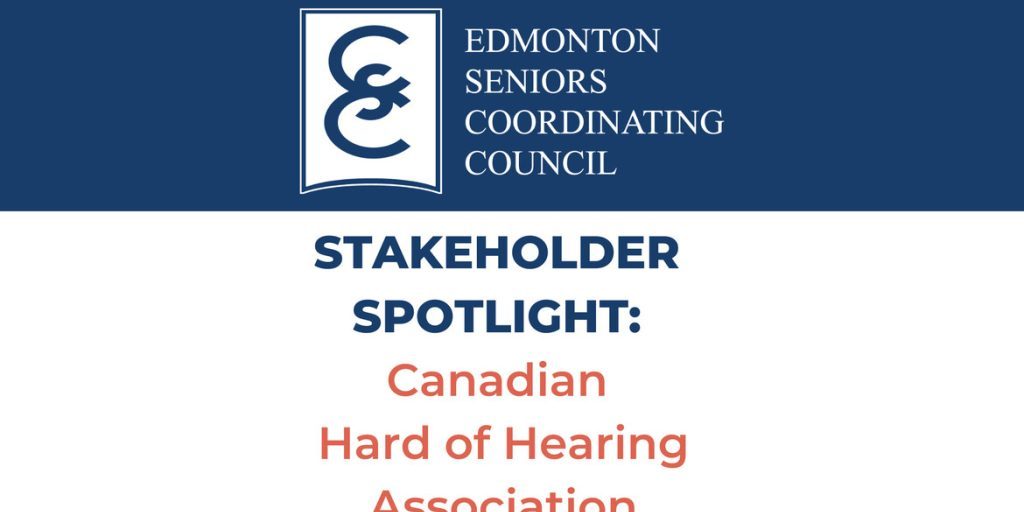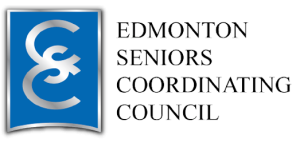Stakeholder Spotlight: Canadian Hard of Hearing Association

There is a proverb that says: “Listening is often what is needed to help someone”. This proverb is truly applicable to the work of the Canadian Hard of Hearing Association (CHHA-Ed) Edmonton Branch. We spoke withCindy Gordon, Program Director at the Edmonton Branch, who helped us understand how their work is the sum of listening and advocating for those with hearing loss in Edmonton. CHHA is supporting healthy well-being for residents of our city, especially older adults.
Cindy is an expert in the field of hearing loss. She speaks with the authority of someone who not only has “a lifetime” of experience (precisely 35 years of working in the field), but also as someone who knows firsthand what it means to live with hearing loss (Cindy uses a hearing aid and has a Cochlear implant).
The program director describes her job as a labor of care to serve a great social issue. “Hearing health is necessary to live well and age well. Hearing loss is the number 1 disability in Canada and this disability is directly affecting our aging population: 1 in every 2 seniors is experiencing hearing loss. Our agency is here to provide support for those people that don’t know or are having a hard time accepting their new reality. They can overcome the sense of shame or fear and live successful lives despite their disability”.
These statistics become particularly important when the number one fastest-growing health epidemic in Canada is also correlated to developing dementia.
People come and tell me about their hearing loss as a small issue. They usually say: “At least I hear something and it’s not a big deal”… but is a really big deal and we need to talk about how could be correlated to dementia.
Cindy Gordon, CHHA
In a recent Lancet report which summarized nine key risk factors for dementia, hearing loss was ranked second on the list. The study found that addressing mid-life hearing loss alone could reduce the risk of dementia by nine per cent.
And it’s not just one study—a growing body of evidence emphasizes the importance of hearing health as a key component of healthy aging.
– Kate Dupuis., Alzheimer Society Blog
According to Gordon, most people facing this prevalent, chronic and “invisible condition” don’t even realize how they are being affected:
“In the majority of cases, it is somebody else who notices for them. Sadly, this is the only disability where people react as if it does not exist and they don’t want to deal with it. If you lose your sight or injure your arm you go to your doctor; but people take their hearing health so lightly. You usually hear them saying “at least I hear something and it’s not a big deal”, but it is a big deal, and we need to talk about how it could be correlated to mental health. Taking care of your hearing is one of the only preventative things that you can do to stop early-onset dementia”.
Let’s talk about how the Canadian Hard of Hearing Association’s work is important for the older adult population of Edmonton…
CHHA is a national non-profit charitable organization for people who are hard of hearing. Their mission is to increase awareness and remove barriers for individuals with hearing loss. Their branch in the greater Edmonton area is doing this by providing support, programs, and advocacy. They’ve been a vital part of the community since the early 90’s.
As their website describes: “Hearing lossis more than just an inconvenience. Even mild hearing loss can have serious social, health and economic consequences. In our senior community, counting Edmonton alone, those affected include more than 100,000 people!”
Gordon explains how when your brain is not hearing, it can start missing parts “so on top of the hearing loss, the brain is not getting the same stimulation; this has a real brain connection”. As a response, CHHA Edmonton is offering free classes called “Your Third Ear”, targeted to seniors, and their communication partners (spouses, friends, neighbors, and extended family). Their intention is to increase awareness and educate about the correlation between healthy hearing and a healthy brain.
When: Twice a month during Spring, Fall, Winter.
Next Spring sessions:
- May 9th, at 10 AM (MDT)
- May 30th at 1 PM (MDT)
Contact: Email Cindy at cindy@chha-ed.com
“As someone who is experiencing hearing loss, I know how fearful it can be. I understand, and that is why I do everything I can to have a healthy brain. With age that becomes very important”. – Cindy
CHHA Edmonton also wants to help people overcome the emotional stigma around hearing loss. Cindy states that one of the big barriers to improving the quality of life of those facing this disability is not being able to successfully wear a hearing aid “you need to love them and you need to wear them every day, all day. The truth is that most people just wear them for one event and then they hide them. It’s about retraining the brain, and we help them navigate that”.
Even though CHHA does not sell hearing aids or do hearing tests, they offer advocacy for people who are discriminated against because of hearing loss, either at home or in a hospital setting.
“If you are not hearing well that is already challenging, but in a hospital, where people are wearing masks, hearing becomes impossible for those with hearing impairment. A hospital is a crucial place where you need to hear your medical information and our clients (patients) are not hearing it right. Mistakes have been made, particularly with our senior population. Seniors cannot always be with someone or have a support person, so it is a very scary place for them” – Cindy.
To support seniors facing this systemic barrier, CHHA has created a “Hearing Healthcare Care Kit”. The kit was designed not only to help them prepare for hospital visits but also inform medical practitioners and staff about what a person with hearing loss needs from them as a patient.
A hearing Healthcare Care Kit can bring awareness of social disparities such as when a senior with hearing loss won’t understand proper medical instructions if the practitioner is wearing a mask.


There is also an unnecessary economic pressure created in seniors’ lives when a practitioner asks them not to wear their hearing aid in the hospital. “By asking a senior to not wear their hearing aid or removing it at the hospital without a proper place to store it, it could mean that their hearing device may be lost. It happens often that hospital staff, by mistake, throw away the little tissue where the individual stores their hearing aids. A pair of hearing aids can cost between $2000 to 10000 CAD.”
Hearing Healthcare Kits:
The kit contains practical information for medical practitioners, tip sheets, a brochure for those with hearing loss, a safe container for hearing aids, battery tester, “communication” badge, accessible stickers, pen and paper, and signage for bed.
Cindy can do training workshops at independent senior residences, and distribute kits to seniors and staff, at no cost. For more information, please contact her at cindy@chha-ed.com
“We used to receive a lot of calls from the hospital asking if we will bring hearing aids to them because they have lost them. We haven’t received as many phone calls since we created the Hearing Healthcare Kit”.
According to CHHA website, 90% of people with hearing loss can improve communication with hearing assistive technology, counseling, or environmental changes. However, this is not always possible when looking at what support is required.
We learned from Gordon that the CHHA-Ed does not receive funding from the government to finance their programs. For seniors trying to buy hearing aids the quest is no less challenging. According to Cindy, our Alberta government has not changed their criteria of funding for hearing support in the last 20 years, even when inflation and the population is changing and increasing. “It is a huge social issue, and the sad thing is that our government does not recognize it. One of the causes of Albertan older adults’ experiencing hearing loss is because of previous job conditions that compromised their health” says Cindy.
At the individual level, this means that seniors able to afford a $5000 plus device could experience an improvement in their communication and life (this device allows them to hear at meetings, outdoor or public spaces like restaurants, church services, and shopping malls). For those facing economic barriers, the most affordable devices (approximately $1500 CAD) might only allow them to participate in one on one conversations when not worn in public spaces.
Alberta Aids to Daily Living (the program that helps Albertans with long-term disabilities, chronic illness or terminal illness) provides some funding for hearing aids, but it is not enough.
Gordon shared that even when their agency is limited by the amount of funding they have received through donations or grant applications, they try to top-up the funding that seniors receive from their “Hearing Assistance Fund”, “we are trying to help as much as we are able, but we have a large population of seniors requesting support and we are just a one and a half staff branch. We are stretched”.
To keep their doors open and keep supporting and advocating for seniors, particularly those that are low-income, CHHA-ed is launching a series of events.
How can you support these events? See our volunteer section in Link Letter.
If you or your organization wishes to participate, please contact Cindy at cindy@chha-ed.com for more information on how to donate time or/and resources.
For more information about the variety of classes and workshops that CHHA-Ed offers, such as the successful speech-reading / lip-reading classes, visit: Speechreading – CHHA-Edmonton
For more information about Hearing loss subscribe to the
I Listen & I Listen Plus Newsletters – Canadian Hard of Hearing Association (chha.ca)
Note: May is Speech & Hearing Awareness Month. This article was written in an effort to bring awareness into this disability.



